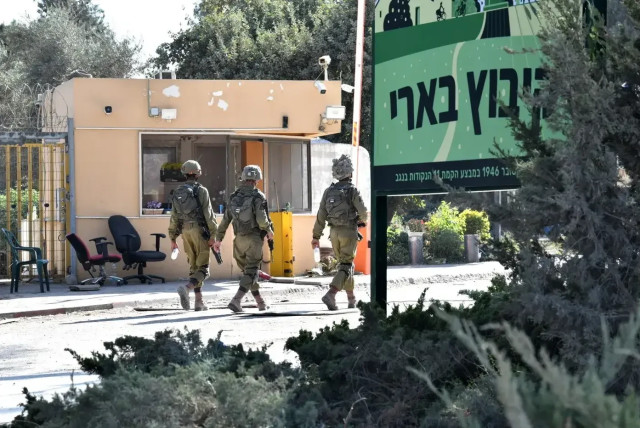Israeli Pavilion at Cannes Film Festival showcases films by directors at Gaza border

Cannes has forbidden participants from wearing pins or displaying objects to protest against the war or for the return of the hostages still held by Hamas.
The 76th Cannes Film Festival began on Tuesday, and the Israeli Pavilion opened its doors as well. This year, the pavilion is dedicated to showcasing films by directors working in the Gaza border area, the location of the Hamas attack on October 7.
Culture and Sport Minister Miki Zohar said in a statement, “I am proud to announce the opening of the Israeli Pavilion at the Cannes Film Festival for the eighth time. The opening of the pavilion during the war reflects Israeli resilience and the Israeli commitment to building bridges of culture and international dialogue even in challenging times. Especially in this complex period, we must amplify the voices promoting the Israeli narrative. For the first time, we will show Israeli films in the pavilion that reflect the unfathomable reality that the residents of the border communities lived in before October 7.”
As part of its focus on the Gaza border communities, movies by filmmakers from Sapir College in Sderot will be shown. They will look at the effect of the years of missile attacks prior to October 7 on the children of the region, as well as on the daily lives of all residents.
After the screening of the films, there will be a discussion led by the director Michal Lavi, whose film is among those being shown. Her brother-in-law, Omri Miran, was abducted from Kibbutz Nir Oz into Gaza on October 7 and is one of the 132 hostages of many nationalities still being held in Gaza by Hamas.
The pavilion’s events and exhibits will also be dedicated to film creation and co-productions between the Israeli film industry and international film industries, to promote dialogue and collaboration.
In addition to the screenings, international panels on diversity in cinema and women in cinema will be held in the pavilion, in which women film professionals who work in countries at war will participate. The Israeli Pavilion at the festival will be open to visitors until May 21.
Banning of protests
IN LIGHT of rising threats against representatives of Israel due to protests against the war, the Cannes Municipality banned protests along the Croisette, the main street of festival activity, and as well as adjacent neighborhoods during the festival.
The Israeli Pavilion at the Cannes Film Festival is expected to host a Shabbat dinner in Cannes for members of the film industry, a festival tradition, according to a statement that its organizer, Gadi Wildstron, made to Variety. “In 2014, when there was another war in Gaza, and we had a Shabbat dinner at the kosher restaurant called Tovo. The French Army blocked off the road and stood on both sides of the street with machine guns. The French are unlike the American authorities and European authorities. They don’t accept anything.”
Cannes has forbidden participants from wearing pins or displaying objects to protest against the war or for the return of the hostages still held by Hamas.
Variety reported that festival director Thierry Frémaux said at a press conference on the eve of opening night festivities: “This year we decided to host a festival without polemics, to make sure that the main interest for us all to be here is cinema, so if there are other polemics it doesn’t concern us.”
Variety also quoted the festival’s general secretary, Francois Desrousseaux, who spoke about security precautions: “This year, we’ve had 15 security briefings, compared with only four or five last year, so I can tell you it’s a very serious matter. We also have AI-powered cameras around the Palais for the first time, and we’ve also starting using new AI safety gates, which allow festival goers to go through security faster without the burden of having to empty their pockets and show their bags.”
In 2017, then culture and sport minister Miri Regev made headlines by walking the Cannes red carpet in a dress showing the Old City of Jerusalem, including the Dome of the Rock.
A number of Israeli movies have won prestigious prizes at Cannes over the years, among them Uri Zohar’s Three Days and a Child, which won the Best Actor Award in 1967 for its leading man, Oded Kotler; Amos Gitai’s Free Zone, for which Hanna Laslo won the Best Actress Award in 2005; Joseph Cedar’s Footnote, which won the Best Screenplay Award in 2011; and Nadav Lapid’s Ahed’s Knee, which won the Jury Prize in 2021.
This year, however, the only Israeli movie taking part is a short film, It’s Not Time for Pop by Amit Vaknin.
Jerusalem Post Store
`; document.getElementById("linkPremium").innerHTML = cont; var divWithLink = document.getElementById("premium-link"); if (divWithLink !== null && divWithLink !== 'undefined') { divWithLink.style.border = "solid 1px #cb0f3e"; divWithLink.style.textAlign = "center"; divWithLink.style.marginBottom = "15px"; divWithLink.style.marginTop = "15px"; divWithLink.style.width = "100%"; divWithLink.style.backgroundColor = "#122952"; divWithLink.style.color = "#ffffff"; divWithLink.style.lineHeight = "1.5"; } } (function (v, i) { });

